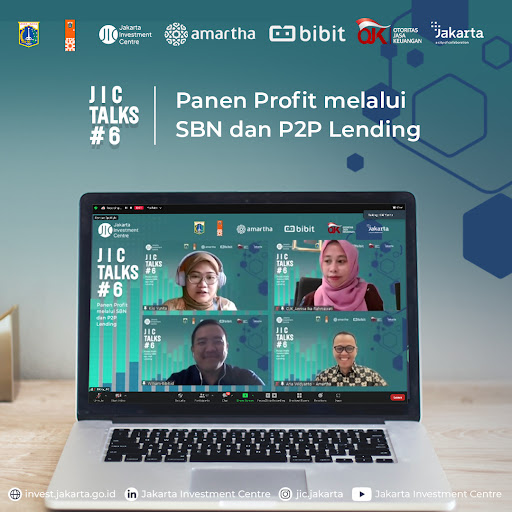

JAKARTA (5/11) - Platforms for investing as well as participating in the country’s economy are now increasingly diverse with the presence of Government Bonds (Surat Berharga Negara/SBN) and Peer-to-Peer (P2P) Lending. To educate the public regarding these alternative investment instruments, Jakarta Investment Centre (JIC) held the JIC Talks 6 with a theme of “Harvesting Profit from SBN and P2P Lending” on Thursday, November 4th 2022.
Were present in this opportunity Analyst in Deputy Director of Fintech Regulation, Research and Development of Financial Services Authority (OJK), Annisa Ika Rahmawati; Director and Chief Risk Sustainability Officer (CRSO) of Amartha, Aria Widyanto; and Public Relations and Corporate Communication Lead of Bibit, William.
Analyst in Deputy Director of Fintech Regulation, Research and Development of OJK, Annisa Ika Rahmawati gave an introduction about P2P Lending which operated under the supervision of OJK through POJK 10/2022 on Information Technology-Based Co-Financing Services. P2P Lending is a financial technology service to borrow money or direct funding between creditors/lenders and debtors/borrowers.
P2P Lending is an investment instrument with crowdfunding type of financing. Each small and medium enterprise (SME) project can be funded from several, even thousands of lenders. Each project has a different tenor with a fixed interest rate depending on the project.
Ika stated that SME plays an important role in Indonesia’s economy as 99,99% of businesses in the country or around 65 are owned by SMEs. This industry absorbs 120 million workforce and contributes 60.51% of the national total GDP.
“We can see here that SMEs have a huge potential in Indonesia. However, there is a challenge regarding its funding where financial institutions cannot fulfill the needs of SMEs funding. Therefore, P2P Lending was born in 2021,” she said.
In line with that vision, Amartha came as a pioneer of the P2P Lending platform in Indonesia. The start-up was founded in 2010 as a microfinance platform whose mission is bridging specifically the SME micro-businesswomen in countryside with financing from lenders to give them more competitive advantage as well as expanding social impact. Currently, Amartha has operated at 35,000 villages in 24 provinces in Indonesia.
“Our vision is to generate funds for the SME micro-businesswomen in the countryside. Therefore, we can invest through apps on our phone. On the other hand, we can also help fund women in Mojokerto, Gorontalo, South Sumatera, etc,” said Aria.
“We can help fund them while investing,” Aria added.
Due to its business model that lends financing to SMEs, payment default surely must be a concern for potential lenders. In order to mitigate it, Amartha has around 5.200 field officers across villages in the country who were responsible for teaching micro-businesswomen to record and manage their business finances.
Moreover, the company also formed the businesswomen to form a group with 15-29 members (tanggung renteng) each to minimize default payment. Furthermore, an insurance facility from third parties is also available for lenders to minimize their investment risk.
Besides P2P Lending, JIC Talks 6 also educates the public about Government Bonds (SBN) as another alternative investment instrument. SBN is securities issued by the government to finance the state budget which can be an investment instrument for its holder (investor) with a low-risk and low-return.
“Basically, SBN is an investment instrument that is expected by the Government of Indonesia to the public where we can buy it, participating in the state’s development while also gaining profit,” stated Public Relations and Corporate Communication Lead of Bibit, William Ndut, as one service provider for SBN trading platform.
He explained that there are several types of SBN including the type with a fixed annual rate of return. There is also another type with a floating floor (with a minimum level) rate of return. “However, unlike mutual funds that can be bought at any time, we cannot buy SBN at any time. Some have (time of purchase) within three weeks, some are one month. It depends on the product period,” William added.
It is expected that through this JIC Talks, more public will participate in SBN and P2P lending to invest while contributing to the state and public development.